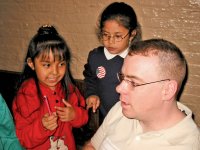Using Poetry to Develop SEL
From the point of view of social-emotional and character development, poetry can help give our students insights into life and life choices.
Your content has been saved!
Go to My Saved Content.In the Smart Hearts Social-Emotional Learning Overview video -- one of the best ways to introduce SEL to newcomers -- there is an excerpt from Robert Frost's poem, "The Road Not Taken," that includes the last three lines and a teacher saying that the essential point is not whether it was right or wrong to take a certain road, but rather, to "follow your heart." Viewers sometimes are not sure if this is the best conclusion to draw from those lines.
Who could imagine that the meaning of this poem is a current controversy, even to the point of a whole book being devoted to it. I think it's worth revisiting as a way of integrating language arts and SEL. Here are some points to follow up on.
The writer "took the one less traveled by."
How did he come to that decision? What do we know about the two roads based on what he says? A careful look by your students will show that there is no reason given for choosing one road over the other.
The writer says, "I doubted if I ever should come back."
What is he saying about the choices we make in life? What does he mean by, "knowing how way leads on to way"? Again, your students are likely to be able to conclude that the decisions we make in life matter and set us on trajectories that we often can't undo. It's an important asterisk to the value of apology, to recognize that apologies can't undo everything negative or undesirable that may have resulted from one's actions.
There is a great old story to illustrate this that your students might appreciate:
Closing Reflections
The final questions to ask your students are ones that author David Orr feels don't have clear answers, intentionally, so as to make us think deeply about them:
- How did he decide which road to take, especially when they both appeared to be the same?
- Why did he say he took "the one less traveled by"? Less traveled by whom?
- Why did he say that in the future, he would tell the story of his choice with a sigh?
Ultimately, from the point of view of social-emotional and character development, the poem can help give our students insights into what might be influencing even the most "obvious" decisions they make, and how important it is to look at our choices after we make them because the longer we go down a road, the harder it is to turn back -- though by no means impossible.
From some analysis and reflection of Frost's famous poem, students will hopefully come to the conclusion on their own that actions have consequences and often affect others in strong ways that we don't realize. These actions we can't always undo, even if we try to do so.
